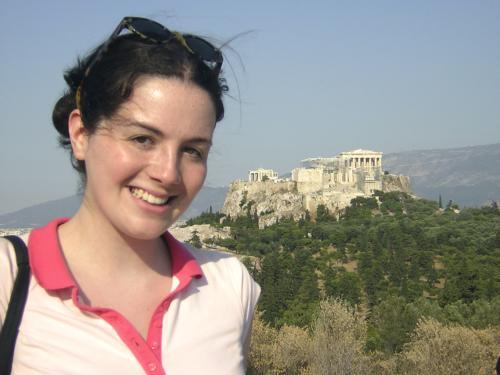I was going to become best friends with Kelly Clarkson this summer. She, touring Europe, would come into the National Museum of Contemporary Art in Athens and in her cheeriest tone, normally reserved for Proactiv skin care commercials, and ask me all about “transcultural communication networks between antiquity and contemporary international art.”
I was supposed to find a charming yet rugged Greek art student. We would fall madly in love over freddo cappuccino and cigarettes in the Agora. His father would preferably own a yacht, which he would sail to Cambridge. My friends would be impressed.
I did not meet a single celebrity in my seven-week stay in Athens, unless you count overhearing Liza Minelli’s soundcheck at the Acropolis. Shipping heirs are not nearly as plentiful as Paris Hilton would have you believe, and the who’s who of Athens are a pretty intimidating lot. But my summer in Greece changed my life despite, or maybe even because of, my decidedly unglamorous experiences.
I normally associate phrases like “best ever” and “life-changing” with peppy blondes in state school sweatshirts or born-again Christians. I ended up in Greece not because of a lifelong dream to study abroad there, but because I lost out on a British fellowship. I based my application essay to the Center for Hellenic Studies on the advice of my stoner Classics buddies. Whether by intervention of the gods or professors with clout, I ended up on a plane to Athens.
College students often use study abroad as a way to improve language skills, enrich term-time academic pursuits, or reconnect with their cultural heritage. I knew only enough conversational Greek to say “No, stop, I don’t want to do that,” I study American History and Literature, and I’m less Greek than a Delta Gamma pledge. But by August, I had adoptive Greek godparents, inspiration for my senior thesis, and a vocabulary slightly expanded to include phrases such as “non-fat milk in my coffee, please.”
I think I fell in love with the country of Greece instead of, as my ever-sensitive grandmother expected, “a greencard-wanting, –opolous somebody” because I was so culturally and linguistically lost. Even the most mundane activities became an exciting challenge requiring all my energy and enthusiasm—my roommate in Athens once found me trying to defrost frozen spinach on the Celsius stove with a dictionary in one hand and a calculator in the other.
Even the way I drink coffee came into question. Greeks can spend hours talking over one espresso; I would consume my caffeine through an IV en route to section if I could. But once I sipped like a regular Athenian, I started to wish there were café culture in Cambridge.
The ability to slow down, do something that seemed frivolous (like studying Modern Greek), and watch the world go by is one that I took for granted. I, and probably most Harvard students, spend so much time in goal-oriented mode that we miss out on the chance to reevaluate our plans, take risks, or just enjoy the fact that at twentysomething, we have relatively few responsibilities.
The Parthenon became a very literal representation of this realization. Almost everyday after work I would look up at the Acropolis and tell myself that I would finally make the sweaty, dusty ascent to see arguably the most important piece of architecture in the world. But I would always go to the beach or sunbathe (the most perfect word in Greek, “heliotherapia”) on my balcony instead.
I know this sounds extremely vapid. The history dork in me was thrilled by antiquity and when I finally got up to the Acropolis, it was amazing. But everyone expected that I would see really really old stuff when I went to Greece; no one, including myself, expected me to come back with any semblance of a tan or the laidback attitude I adopted.
But spending seven straight hours under an umbrella in the sand was probably the best way to experience “real” Greek culture and do something totally different from my usual routine.
The sun usually gives me freckles or second-degree burns—sometimes even in the dead of winter during a 15 minute snowbound trek to Widener. But I took cues from locals on how to enjoy the sun without a case of heat stroke, and found myself waxing philosophical in the Mediterannean instead of at the museum.
Granted, by the end of summer my brother was ten shades darker than me just from staying inside and playing X-Box. I probably won’t end up taking Greek this semester. I will start chugging Starbucks while writing my first response paper.
Even though I miss Greece every day, maybe the most long-lasting effect of studying abroad is how it makes Cambridge seem cosmopolitan and gangly blockmates as interesting as swarthy yacht owners. I left Athens behind, but not the attitude.
I spent too much time with laidback Greeks to let myself get stressed about shopping classes. I know the various Parthenons in my life are important—getting into grad school, finding a job, deciding how much to invest in extracurriculars—but can probably be conquered later. For now, I just want to savor these last warm days with the everyday rockstars I call my friends.
Kristina M. Moore ’08 is a History and Literature concentrator in Dunster House. She would still like to meet Kelly Clarkson.


